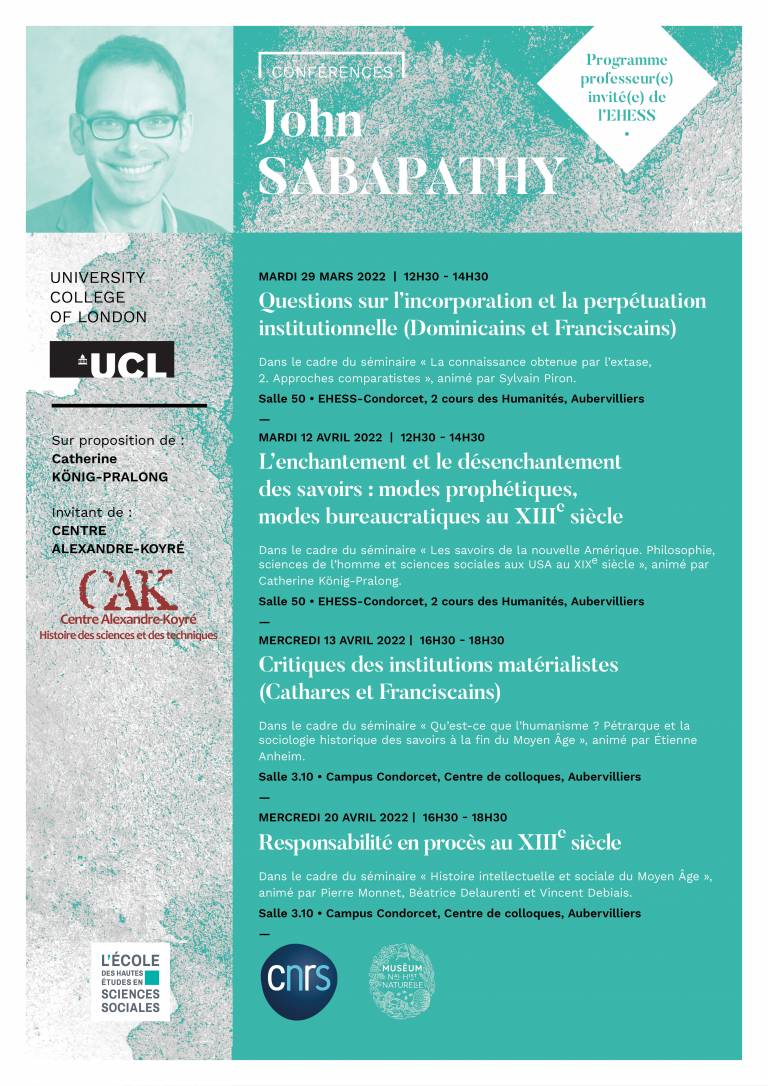John Sabapathy a Visiting Professor at the École des Hautes Études en Science Sociales
25 May 2022
During March and April 2022, UCL History’s Professor John Sabapathy was a Directeur d’études invité (visiting professor) at the École des Hautes Études en Science Sociales’s (EHESS) Centre Alexandre Koyré.

During his visiting professorship, Professor Sabapathy delivered four conférences (lecture-seminars), on themes from his current project on thirteenth-century Europe, a forthcoming volume in the Oxford History of Medieval Europe. The title for the lecture series was Processes of institutionalisation in thirteenth-century Europe and was supported by a Leverhulme Trust fellowship.
The four lectures focused on a characteristic phenomenon of the 'beautiful thirteenth century': institutionalisation. The four distinct but related themes investigated the paradoxes and tensions generated by processes of institutionalisation. They also offered the opportunity to "think by case".
The content of each of the lectures was as follows:
1. Questions on incorporation and institutional perpetuation (Dominicans and Franciscans). In the seminar "La connaissance obtenue par l'extase, 2. Approches comparatistes" by Sylvain Piron, 29 March.
Starting with Dante’s comparison of the Franciscans and Dominicans in Paradiso 11-12, this seminar explored the challenges posed by institutionalisation within the two main mendicant orders. Adopting analytical frameworks from Pierre Olivi, John Searle and Virginie Tournay it studied anxieties about novelty and permanence within these orders and suggested that the institutional differences between Franciscans and Dominicans can in part be explained by the different charismas operating within the two orders.
2. The enchantment and disenchantment of knowledge: prophetic and bureaucratic modes in the thirteenth century. In the seminar "The knowledge of the new America. Philosophy, humanities and social sciences in the USA in the 19th century" by Catherine König-Pralong, 12 April.
This seminar explored concordances between these two modes of knowledge both of which become increasingly popular from the end of the 12th century: prophecy and bureaucracy. These are rarely considered together, but they seem to have real affinities in terms of predicting the future and enabling those in power to orientate themselves between word and world. In thinking about how they develop as ‘sciences’ however, the paper suggested that bureaucracy undergoes an 'enchantment' and prophecy a 'disenchantment' during this period, analysing Richard of Ely's Dialogus Scaccarii, Joachim of Fiore and the relationship between Pope Clement IV and Roger Bacon. The seminar suggested that historians need to consider together types of knowledge which they routinely analyse separately.
3. Critiques of materialist institutions (Cathars and Franciscans). In the seminar "What is humanism? Petrarch and the historical sociology of knowledge at the end of the Middle Ages' by Étienne Anheim, 13 April.
Without addressing vexed debate about the existence of 'Cathars’ directly, the lecture suggested that a comparison between Franciscans and Cathars allows us to observe opposite anxieties about 'materialism' in both groups. For the Franciscans, the worry was about their own materialism as an institution, while they celebrated God’s incarnate creation. Conversely, the Cathars were worried about the incarnate world, but seemed untroubled by the fact of their 'institutional' existence. These parallelisms point to very different concerns about the material world in the thirteenth century, as well as the need to re-think what we mean by institutionalization.
4. Responsibility on trial in the thirteenth century. In the seminar 'Intellectual and Social History of the Middle Ages' by Pierre Monnet, Béatrice Delaurenti and Vincent Debiais, 20 April.
The question of control and responsibility in the thirteenth century is a major historiographical subject, encompassing both the fiscal and the pastoral. Historians have observed a strengthening of control over officers (lay or ecclesiastical), but also over higher powers (from kings to popes). The seminar investigated some of the unexpected consequences of this evolution, based on a case study of the English reform movement of the middle of the century and the controversies between its protagonists, notably Simon de Montfort and Gui Foucois (Pope Clement IV).
The EHESS seminars are the result of a Leverhulme Research Fellowship.
 Close
Close

